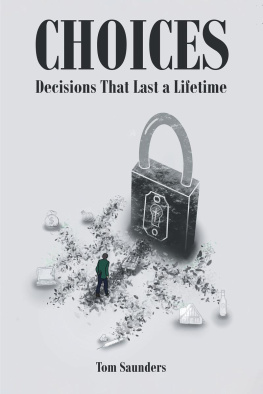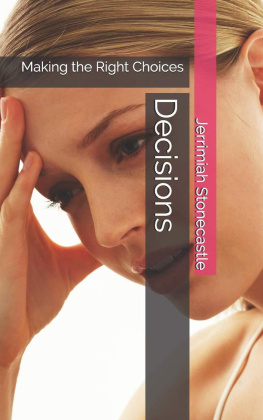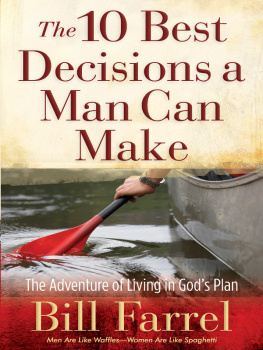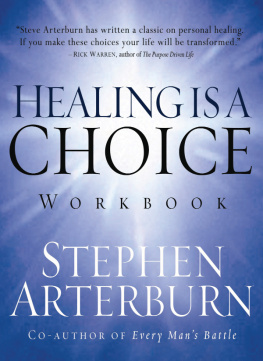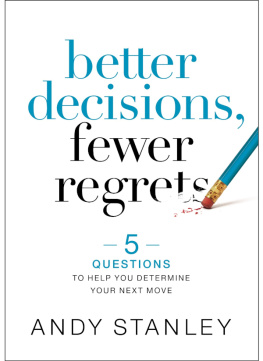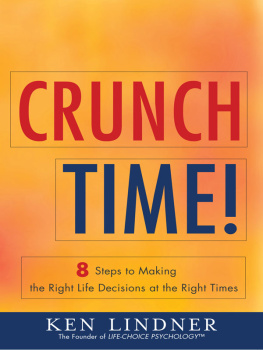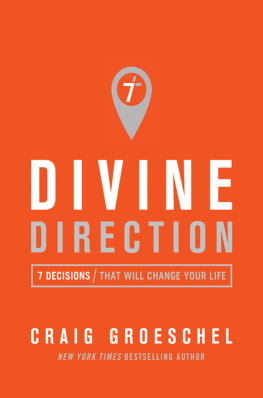Life Choices
Lives in Context
This is an extensively revised edition of Deciding: Self-Deception in Life Choices (London: Methuen, 1987).
First published 1996 by Westview Press
Published 2018 by Routledge
711 Third Avenue, New York, NY 10017, USA
2 Park Square, Milton Park, Abingdon, Oxon 0X14 4RN
Routledge is an imprint of the Taylor & Francis Group, an informa business
Copyright 1996 Taylor & Francis
All rights reserved. No part of this book may be reprinted or reproduced or utilised in any form or by any electronic, mechanical, or other means, now known or hereafter invented, including photocopying and recording, or in any information storage or retrieval system, without permission in writing from the publishers.
Notice:
Product or corporate names may be trademarks or registered trademarks, and are used only for identification and explanation without intent to infringe.
Library of Congress Cataloging-in-Publication Data
Sloan, Tod Stratton, 1952-
Life choices : understanding dilemmas and decisions / Tod Sloan.
p. cm.(Lives in context)
Rev. ed. of: Deciding. 1987.
Includes bibliographical references and index.
ISBN 0-8133-2656-7ISBN 0-8133-2657-5 (pbk.)
1. Decision-making. 2. Self-deception. 3. Interviews.
I. Sloan, Tod Stratton. 1952- Deciding. II. Tide. III. Series.
BF441.S6 1996
153.83dc20 95-42440
CIP
ISBN 13: 978-0-8133-2657-3 (pbk)
The range of choice open to the individual
is not the decisive factor in determining the degree
of human freedom, but what can be chosen
and what is chosen by the individual.
Herbert Marcuse, One Dimensional Man
Lives In Context
Series Editor: Mihaly Csikszentmihalyi, University of Chicago
Perhaps the most important challenge for contemporary psychology is to apply its conceptual models and experimental findings to the explanation and understanding of individual lives lived in the complex world outside the laboratory. This task requires a more integrative, holistic, socially and historically informed approach to the study of individual behavior than is usually practiced by psychologists. The Lives in Context series offers scholars an opportunity to take up the challenge, to publish their best workwork that combines empirical and theoretical rigor with an understanding of the whole person in natural settings.
Life Choices: Understanding Dilemmas and Decisions, Tod Sloan
Forthcoming
Transforming School Cultures to Enhance Student Motivation and Learning, Martin L. Maehr and Carol Midgley
I argue in these pages that decisions are not private and personal accomplishments. Neither is this book. Every idea presented here is a synthesis of interactions with others through conversations, dialogues, readings, and life experience. To acknowledge the multiple sources of these words, I wish to thank my friends and colleagues for their support for this investigation of life choices, in particular George Rosenwald, Randy Earnest, Barnaby Barratt, Gary Gregg, Michael Jackson, Donald Brown, and Jack Meiland. A hearty thanks to those who read early versions of the manuscript and from whose advice and encouragement I benefited: John Broughton, Larry Wrightsman, Rae Carlson, Kenneth Gergen, and Isabel Vega. My deepest gratitude goes to the courageous volunteer interviewees for the hours they devoted to this research and for permission to tell their stories. For clerical assistance beyond the call of duty, I thank Lucy Mylar, Karen DeShong, Vickie Booth, and Donna Smith. Theresa Fassihi provided helpful editing on the final version of the manuscript.
A portion of my research expenses was covered by the Department of Psychology at the University of Michigan and by a faculty research grant from the University of Tulsa Graduate School.
Tod Sloan
Our common history descends from a disastrous decision: Adam and Eve chose badly and paid for it. We are living with the consequences, determined each of us to choose more wisely, to make decisions that will retrieve the lapsed bliss. Our own choices seem harder to us, of course, than that first one. But we receive no leniency. Make the wrong move, we are told, and your life will be spoiled.
How early the agony begins! As mere children, we are expected to choose among alternatives placed before us as though by divine authority. And as we choose correctly, we find favor in the parental countenance. We learn not only to choose correctly but that correct choice is the key to happiness.
The joint force of mythic and familial morality persuades us that choosing wisely is our unavoidable duty, our gateway to fulfillment. Not to be free to choose would mean not to be human. Accordingly, people who squirm in the throes of indecision are pitied as weaklings. Sigmund Freud gave us the pathography of Zweifelsucht, doubting mania.
In reading Dr. Sloans book, we begin to suspect that wisdom gravitates to doubt. Not being able to choose is the philosophical minds subjective signal that it has finally grasped the complexity and obscurity of its situation. We recall that it took a warrior to undo the Gordian knot. Decisiveness is the self-directed callousness with which we smother subtlety, a microsuicide perhaps. Yet resoluteness is considered a virtue. So powerful is the moral pressure to make smart moves that a wise psychiatrist had to urge a young doctor not to decide merely in order to have made a decision.
We suppose that we think out the solution to a dilemma. But what we call thinking is both more and less than it seemsless because of its imperfect rationality, more because the vindication we often hope to squeeze from a right decision cannot be won with mere thoughts. This book opens our eyes to the multiple agendas that wait upon the decision. People often expect to satisfy not only themselves but an implicit audience. They attempt to bring order not only into the world they inhabit but also to their psychic households. They often want to settle not only the issue at hand but all issues forever, not only to create a better life but to achieve immortality. No decision can live up to such expectationsespecially since, as the author shows, who one is limits what one can decide. This is why decisions are so draining, why they seem so overblown in retrospect. Tost decisionem omne animal triste.
From Dr. Sloans excerpted life stories, we learn that so-called major life choices draw their significance not merely from unconscious conflicts but from the anxiety of ignorance. At the moment of deciding, we simulate omniscience. If we really knew the consequences of our available choices, we could declare our preference. In truth, however, a life choice is called major precisely when we do not know, when we are about to overreach ourselves, plunging into uncertainty. The technological mentality offers us flow charts, algorithms of choice behavior, and decision trees as though these could enrich our wretched data base. The case histories in this volume serve as fitting rejoinders to the simplicities of decision theory. They sober us up, give us an illumination, a guidance without the usual cheerful prescriptions of self-help books.
The ignorance we face is neither the theologians imploring us to humility nor the poets contemplating the heavens. It reigns in the gap between what society demands of individuals and what it allows them: To thine own self be true! But with what? The men and women in this book feel under command to lead a worthy life, one that is truly theirs and no one elses, and yet they dont know where to look. The consequences of various options are inscrutable, out of control. Lo! The poor aborigine had it easier. He knew all he needed to know to please his gods and himself, and what he didnt know would not diminish the dignity of his minimalist choices. If the quarry escaped, if the crops failed, if he succumbed in combatthese were not tallied as the outcomes of poor decisions. We see now that the ignorance we face is ignorance made. The decision tree is not the tree of life.


